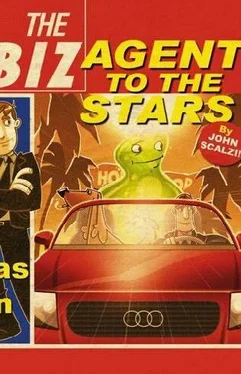Never forget that publishing is a business: Science fiction editors do what they have to do — get out the titles that fly off the shelf. And what flies off the shelf? Media tie-ins, classics, and military science fiction (probably in that order). The current book-selling atmosphere is not one that is conducive to being able to nurse along a title that has the potential to become a cult classic, or support an author whose output would make him or her a citizen of the authorial middle class known as the "mid-list." Books have to come out swinging (maybe there are non-military, non-media-tie-in SF books by new authors being published. They just don't stay on the shelves for long).
Is this a good state of affairs? Of course not, especially if you're a new author with an offbeat idea. But it's not entirely in the hands of the editors. Before editors can buy what they think people should read or ought to read, they need to buy what they know people will read — their bosses in the massive media conglomerate expect shareholder return, and the bookstores expect product that puts money in the till. Editors shouldn't have to apologize for doing the business of business, and most of them don't. For better or worse, this is the media world we live in at the moment.
I personally find it depressing, however. Not just as an author, but as a reader. I long ago read all the classic authors I wanted to read, I haven't the slightest interest in the latest quickie featuring Captain Picard, and most military science fiction bores me. I want SF that's fun, that has attitude, that's not afraid to have a sense of humor, or to not rely on techno-porn to engage the reader. I want characters, not guns (or, at least, character first, guns second). I'm not finding it, and as a result, I'm not buying much science fiction these days. Science fiction publishers, I should note, have returned the favor by not buying my work.
Obviously, their decision hurts me more than my decision hurts them. but I can't help but wonder if there's entire chunks of people like me that feel alienated right now from the genre they love.
* * *
But let's posit for a moment that there is an audience for the science fiction that isn't selling in the bookstores. After all, editors have been known to be wrong, from time to time (I've been one. I know).
Ah, but there's the catch: In order to develop that audience, you have to be published, but in order to get published, you have to write what the editor thinks will sell. SF editors are the gatekeepers to your audience. Or have been — until the last few years, when it suddenly became possible to publish online, without the intermediary step of convincing an editor (or an agent, who will then convince an editor). Now anyone can publish anything they want — including the "unsalable" science fiction.
However, there's now a new catch: When everyone can publish, most of what is published is crap. After all, most of what was published before the Web was crap — just try to imagine what it's like now that anyone can get past the gatekeepers (there, there. You can stop shivering now). The best way to prove the quality of your material is to have it bought and published by a reputable source — say, an SF book publisher. And the only way to do that, of course, is to write what the editor thinks will sell. We're back where we started.
I'll be dead honest — I'd much rather have sold this book to a science fiction publishing house than to publish it here. Nothing confers legitimacy better than the fact that someone else is willing to risk their own capital on it. Be that as it may, I couldn't sell it, for whatever reason. The biggest challenge now lies in convincing people that just because it's on my Web site, it doesn't mean it's bad .
* * *
I'll confess something else here: I didn't really make that much of an effort to sell the book. I sent the book (or at the very least, three chapters and a synopsis) to three agents and to three publishers. In terms of publishing attempts, this is pretty pathetic — everyone knows how Dune , one of the great science fiction novels of all time, was rejected 18 times (or more, depending on who's doing the telling) before someone finally relented and published the damned thing. If Dune needed 18 tries, surely my little book (which is certainly no Dune ) should be hard-pressed to get through the door after just three tries at the agents, and three tries at the publishers.
Fair enough. But you know what? If Frank Herbert wanted to get published, he didn't have much of a choice: He could publish it himself, at great cost (and likely with the end result being thousands of copies moldering in his wood shed), or he could keep submitting the work to publishers until someone took a nibble. It's good that Herbert was used to dealing with spans of thousands of years through his writing — when you're waiting to hear back from a publisher, that's how much time seems to pass.
I, on the other hand, have another option. The reach of this Web site is theoretically limited only by the number of computer users on the 'Net (as a practical matter, of course, it's further limited by the number of people who know the site exists, a rather smaller number). The cost of "publishing" here is nil — it costs me nothing to upload these pages; it costs nothing for people to access them. I've paid for the domain name and the Web hosting, but I paid for that anyway, prior to the appearance of this novel; its cost is not directly related to "publishing" this. But, if I wanted to, I could get a Web site on something like Geocities or Xoom, suffer their ads, and pay nothing. So, it's possible to have a (theoretical) worldwide reach without killing myself financially. And the publishing of the book can be damn near instantaneous.
Which is the other thing. I'm really just too damned impatient to wait for a science fiction house to decide whether or not they want to take a chance on this book. It simply takes too much time.
How much time? Well, Baen Books asks for nine to twelve months; if you send your book in there, it could conceivably take an entire year to learn your manuscript has been rejected. That's just a ridiculous amount of time. I'm not going to say that the folks of Baen don't legitimately need all that time to wade through the slush pile, but come on . Other publishers require lesser but still weighty ping times: Two to six months, typically. And since many publishers request sample chapters and a synopsis, even if you pass the first cut, there's an additional wait as they read through the whole manuscript.
That is, if they bother to accept unagented manuscripts; many science fiction houses do not. You'll need an agent to present your book. Agents take as much time to read and evaluate as publishers do — and then there's still the process of getting the book read at publishers. Shipping the book to three agents and three publishers took the better part of those two years. If I were on Herbert's timetable in terms of acceptance of the novel, my newborn daughter would be well into elementary school before this book got bought — after which it's an additional one or two years before the book actually hits the stores.
Where, of course, it will have a month (if that) to sell or be wiped off the shelves forever.
Ridiculous.
* * *
The bad news for me in publishing the book this way, is that I pretty much guarantee that I forgo any economic benefit from the book: No advance — what am I going to do, pay mayself? — and no royalties. This is, alas and alack, true enough. I'm positioning this book as "shareware" and encouraging folks to send me a dollar if they read it and enjoy it (they can send more if they really enjoy it, of course), but I'm really not holding my breath, waiting for a parade of George Washingtons to tromp into my mailbox. This resignation shouldn't stop you, the reader, from sending me that dollar. Rather the opposite, in fact. Please, prove me wrong. Baby needs shoes.
Читать дальше











